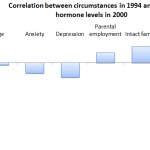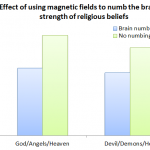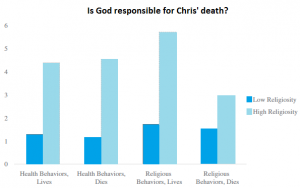
People who have a mystical experience might describe it as being “touched by some higher or greater truth or power“, or as “experiences felt or experienced beyond the realms of ordinary consciousness”. Psychologists define them as a breakdown in the usual sense of time or space, or of the difference between the self and the external world.
Irene Cristofori (Rehabilitation Institute of Chicago) and colleagues wanted to test two competing theories of how mystical experiences are generated in the brain. They may result either from from increased activity in regions of the brain associated with emotion, abstract ideas and imagery. Alternatively, they result from reduced activity in the brain’s frontal lobe, a region associated with what’s called ‘executive function’. Executive function has been described as ‘the CEO of the brain‘.
In their study, they ran brain scans on 116 Vietnam War veterans with head wounds that damaged their brain, as well as 32 healthy controls. They also assessed them on the Mysticism Scale, which measures feelings of unity, sacredness, ineffability, and joy, as well as a sense of transcending time and space and an intuitive belief that the experience is a source of objective truth about reality.
The vets with brain injury were fairly normal on most psychological tests that they ran, but were much more likely to have had mystical experiences.
They found that damage to the forebrain (strictly, the dorsolateral prefrontal cortex) was linked to the highest mysticism scores. The supports the idea that damage to the brain’s executive function allows mystical experiences to occur.
They also found that damage to the parietal lobe of the brain also contributed to mystical experiences. Although there weren’t enough patients in their study with this kind of damage for it to be conclusive, this does match with what previous research has found. The parietal lobe is responsible for generating our sense of self and our location in space and time.
Now, that doesn’t mean that people who have mystical experiences have brain damage. But it does help to unpick what thought processes might be going on.
What the researchers think is happening is that mystical experiences occur when we fail to identify clear, causal explanations for experiences. Damage to the frontal brain impairs our ability to generate these explanations, so the brain defaults to a cruder, less precise way of understanding the world around us.
They point out that their research apparently conflicts with other research showing that activity in the frontal brain is actually critical for religious behaviours. That’s because these parts of the brain also deal with interpersonal relationships – such as believers have with god, and churchgoers have with each other.
So the brain is complex, and religion is complex. But these brain studies are giving amazing insight into the different kinds of religious experience.
![]() Cristofori, I., Bulbulia, J., Shaver, J., Wilson, M., Krueger, F., & Grafman, J. (2016). Neural correlates of mystical experience Neuropsychologia, 80, 212-220 DOI: 10.1016/j.neuropsychologia.2015.11.021
Cristofori, I., Bulbulia, J., Shaver, J., Wilson, M., Krueger, F., & Grafman, J. (2016). Neural correlates of mystical experience Neuropsychologia, 80, 212-220 DOI: 10.1016/j.neuropsychologia.2015.11.021















